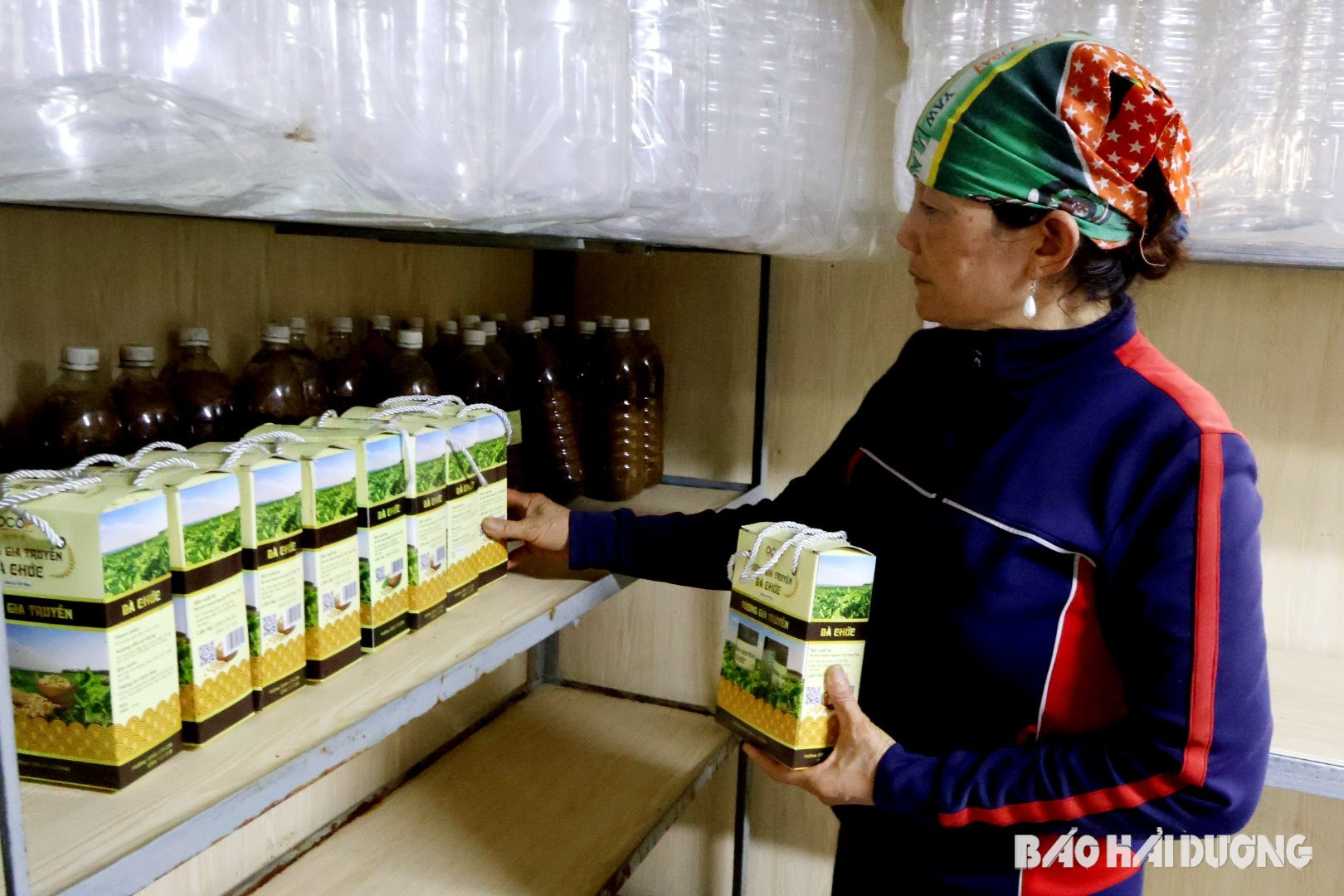As a typical local product, however, many OCOP products of Hai Duong are still difficult to sell and improve their position in the market.

Mainly sell to you old goods
In 2021, Mr. Nguyen Van Thuan's "Van Thuan Peanut Oil" product was one of the few products to receive the first 3-star OCOP certification in Chi Linh City. This is also a typical product of Hoang Tien Ward.
Located in the largest peanut growing area in Hai Duong province, the source of raw materials is guaranteed to be of high quality. Every year, Mr. Thuan purchases about 30 tons of peanuts in shells to make raw materials for oil pressing. The oil pressing is carried out according to the correct process to ensure the best quality products. The oil is pressed using heat technology so it retains the characteristic aroma of peanuts and can be preserved for 2 years. The product is of high quality, has a clear origin and has all kinds of certifications, but consumption is still small.
Mr. Nguyen Van Thuan, owner of a peanut oil production facility, shared: “The product is still mainly sold to old customers, wholesale in neighboring provinces and cities, but has not yet reached clean food stores or supermarkets. Being recognized as an OCOP product has not promoted the consumption of the facility. Therefore, this year, the product has expired its OCOP certification, but I have no intention of applying for a re-issuance of the product.”
Difficulty in expanding the market is also a common situation for many other entities participating in the OCOP program. Before participating in the OCOP program, Ms. Nguyen Thi Thoa, owner of the 3-star OCOP product “Mrs. Chuc’s Traditional Soy Sauce” in Thai Tan Commune (Nam Sach), expected that the product would be supported for consumption at some clean food stores in the province so that everyone would know about her family’s traditional product. But the reality was much different, leaving her disappointed.
“In 2023, our family's soy sauce products will be certified as OCOP. The district supported us to participate in a number of booths selling OCOP products at festivals in the province such as Long Dong Temple or Bia Temple Festival... but the number of customers was not high, so we could hardly sell the products. In addition, when selling OCOP products, there are additional costs for labels, so old customers only buy products in normal plastic bottles. Currently, we consume 2,000 - 3,000 liters of soy sauce each year at restaurants and eateries in and outside the province. The consumption output has not increased compared to before participating in the OCOP program," said Ms. Thoa.
Add support mechanism
.jpg)
Since 2019, the OCOP program has been widely deployed in the province. After 5 years of implementation, Hai Duong has 351 OCOP products, including 118 4-star OCOP products and 231 3-star OCOP products. There are quite a few products known to domestic consumers. In addition to paying attention to product quality and ensuring food safety, many entities have also invested in building packaging and labels, origin traceability stamps, and building product brands to meet market requirements. Some products have been present in modern retail systems, built a large distribution network and become export items, positively received by the market, with annual revenue reaching billions of VND, creating jobs for many workers such as Hoang Giang green bean cakes, gai cakes, Nga Toi gac cakes, and perch rice cakes...
.jpg)
However, besides products with stable consumption markets and good revenue, there are still OCOP products lacking output and struggling to find a market. The dried oyster mushrooms of Mr. Luyen Huy Hung in Ngo Quyen commune (Thanh Mien) are an example. Before participating in the OCOP program, he researched carefully and found many effective models in other provinces and cities. “In some other provinces and cities, OCOP products are sold at the OCOP product consumption store system with high efficiency, but in Hai Duong there is no such system. I have also tried to bring the products to modern retail systems but there are many barriers and potential risks. I hope the province has a policy to connect and support small business owners so that they can be consumed in stores and supermarkets with more stable output.”
According to the Department of Rural Development, every year the province has policies to support entities in building linkage chains and promoting trade at many fairs inside and outside the province. Many entities have found large customers and partners to consume their products. However, many entities still face difficulties in the consumption stage. The reason is that some OCOP products are produced at small, seasonal establishments, the quantity of products is not stable, mainly consumed directly, with very few traces of processing industry and high technology. Only small-scale business households do well in the production stage, while the promotion stage is still weak.
OCOP is a long-term, key rural economic development program that needs to be prioritized. The province and local authorities need to soon develop plans to build centers to display and introduce OCOP products in the regions, creating a driving force to connect and promote between regions and localities and exploit tourism advantages and potentials.
Khanh Hoa